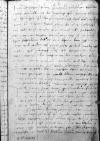So der wyrdige her(r) ⌊Ioannis Rudulsh⌋, thumher zu der ⌊Frawenburg⌋, dysse zeyt im korzcen zu ⌊Thorn⌋ wyrt sein, / der euch vylleicht wol bekant, / ist unser freuntlych bit, / in wolt von meynnen wegen vormugen, / wy ich im auch thue schreiben, / das er von Thorn kan uff ⌊Colme(n)sehe⌋ / und vordan uff unser sloss ⌊Frideck⌋, / weiter uff unsern hoff ⌊Ploweyss⌋ sich hie her gen der ⌊Lobe⌋ wolt begeben. / Der wegen ich den wyrdigen herrn(n) ⌊Merten Zceme⌋, wm ms. w(!)
⌈mm ms. w(!)
⌉einen(n) vicarien(n) und thum herr(n) zu ⌊Colmensehe⌋, hab lossen schreyben, das es im ymants zugebe, / der in bysher thue beleyten. Hirinne geschege myr nycht klein wolgefallenns. Auch schicke ich euch drey feslein waltnis öl mit ein gelegtem zceichen bezceichtnyt, welche ich bit, wolt herrn ⌊Jorge(n) Hegel⌋ gen ⌊Crockaw⌋ zuschicken. Was dy fure wyrt kosten, wolt myr ansezce(n), das ich euch freuntlich wyl lassen zcalen und ausrychten, und so knur der freyscher von ⌊Crokaw⌋ wyder kompt, wolt in myt den ersten an mich schicken, / do bey schreiben, wor inne ir yn vorlegt, so euch zu dancke wyder werdenn Gothe befhelen. / Grust ewer thugentsame hausfraw, / und sagt ir, das der S. aus dem kloster ich weys nicht worhin entloffen sey etc. Den schercz vorstehet ir wol etc.

 AAWO, AB, D. 7, f. 28r
AAWO, AB, D. 7, f. 28r